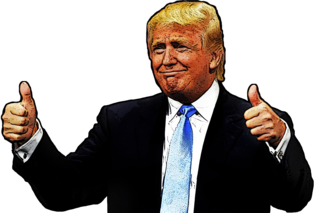Health
Diagnosing Trump With a Mental Illness
Should health professionals diagnose celebrities from afar?
Posted January 5, 2021 Reviewed by Matt Huston

In this post, I explore the issue of diagnosing public figures. I use the example of discussions regarding the mental health of Donald Trump; though his presidency is ending, Trump’s mental health and character remain a hot topic.
Diagnosing celebrities
Historically, people have questioned the mental health of many celebrities and public figures (e.g., Princess Diana, Britney Spears, Winston Churchill, Carrie Fisher, Robin Williams, Genghis Khan).
They have judged the character of not only those who have spoken of being ill but also those who have shown odd or inappropriate behavior and those accused of incompetence or being a danger to the public.
But perhaps even a knowledgeable public can not be expected to provide an unbiased opinion regarding the mental health of such figures; after all, people’s opinions are shaped by their ideologies, especially regarding polarizing public figures like Trump.
What about health experts? For example, when psychiatrist Jerrold Post diagnosed Saddam Hussein (whom he had never met) as a “malignant narcissist,” was this a professional opinion based on unbiased evidence? If so, then one would imagine that these days health experts have access to a lot more information if they choose to evaluate the temperament, personality, and mental health of Donald Trump.
And countless experts have already done so: They have commented on Trump’s alleged paranoid, sadistic, and psychopathic tendencies; diagnosed him with narcissistic personality disorder; and suggested he might suffer from neurological conditions like dementia and Alzheimer’s disease. Naturally, many have questioned his fitness to serve as the President of the United States.
Over 70,000 health professionals even signed a petition, saying “Donald Trump manifests a serious mental illness that renders him psychologically incapable of competently discharging the duties of President of the United States.”
And a book written by over two dozen mental health experts also argued that Trump, whether due to his personality or mental health issues, is not fit to be the president.
Last, in December 2019, several hundred mental health professionals sent a statement to the House Judiciary Committee members to express their concerns that due to his “brittle sense of self-worth,” Trump may act more dangerously as his impeachment approaches.
Can health professionals diagnose celebrities from afar?
Health professionals are not usually allowed to comment on a person’s mental health unless they have personally assessed the individual and have conducted a full examination. Psychiatrists are limited by the Goldwater Rule.
Why is it called the Goldwater Rule? In 1964, a (now defunct) American publication called Fact was sued by Barry Goldwater (the Republican Party nominee) because it surveyed thousands of psychiatrists asking them whether Goldwater was psychologically fit to become the president, and reported that over 1,000 believed Goldwater was unfit.
Psychologist Scott O. Lilienfeld and colleagues have taken issue with the application of the Goldwater Rule in psychology. They note the rule rests on the assumption that in-person interviews are necessary for an accurate diagnosis. In reality, “not only are in-person interviews subject to a host of biases,” but “carefully collected [observational data] can often yield information of equal or higher validity as direct interview data.” In addition, “diagnostic information of high validity can frequently be extracted from file information alone” (p. 19).
When such data is available and indicates the person who holds a position of power is a danger to the public, then psychologists should be allowed to diagnose the politician and warn the public. But psychologists, the authors warn, should not judge whether a person is fit for office.
Harvard psychologist Richard McNally says suspending the Goldwater Rule only in such specific circumstances is of little use. In other words, what would publicizing a diagnosis accomplish? He says the voters in Trump’s base “either disregarded or applauded the very behavioral patterns that drove other voters away.” Therefore, a psychiatric opinion is unlikely to have “changed their minds” (p. 29).
Another critic, Nick Davis, worries diagnosing public figures would only encourage stigmatization. In addition, he says everyone, including those holding office, is entitled to privacy regarding their mental health.
Concluding thoughts on diagnosing celebrities
So, should doctors comment on the mental health of Donald Trump? Or do concerns regarding ethical obligations to protect society from a dangerous leader (assuming the diagnosis would accomplish this) carry less weight than concerns regarding stigmatizing the mentally ill?
And then there is the issue of hidden agendas: Doctors might use the power and authority of their position to pathologize those they dislike or those whose behaviors are negatively affecting their personal lives.
This is particularly relevant because Biden’s mental health, physical health, and competence have also been questioned. McNally calls this the “danger of dueling doctors,” meaning “partisan clinicians eager to diagnose mental disorders in political candidates of the opposing party.”
So, what should we do instead of questioning Biden's or Trump’s sanity and competence? It might be better, according to psychiatrist Allen Frances, to criticize a president’s potentially harmful and dangerous policies. Just to give one example, instead of pathologizing Trump, many have used logic and evidence to criticize his policies related to women, sexual minorities, Blacks, religious minorities (e.g., the “Muslim ban”), and others.




